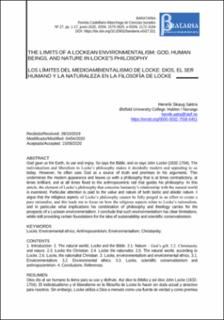| dc.contributor.author | Sætra, Henrik Skaug | |
| dc.date.accessioned | 2020-06-24T13:57:05Z | |
| dc.date.available | 2020-06-24T13:57:05Z | |
| dc.date.created | 2020-06-23T10:19:00Z | |
| dc.date.issued | 2020-06-22 | |
| dc.identifier.citation | Barataria. Revista Castellano-Manchega de Ciencias Sociales. 2020, (27), 1-17. | en_US |
| dc.identifier.issn | 1575-0825 | |
| dc.identifier.uri | https://hdl.handle.net/11250/2659361 | |
| dc.description.abstract | God gave us the Earth, to use and enjoy. So says the Bible, and so says John Locke (1632-1704). The individualism and liberalism in Locke’s philosophy makes it decidedly modern and appealing to us today. However, he often uses God as a source of truth and premises in his arguments. This undermines the modern appearance and leaves us with a philosophy that is at times contradictory, at times brilliant, and at all times fixed to the anthropocentric rail that guides his philosophy. In this article, the element of Locke’s philosophy that concerns humanity’s relationship with the natural world is examined. Particular attention is paid to the value and nature of both biotic and abiotic nature. I argue that the religious aspects of Locke’s philosophy cannot be fully purged in an effort to create a pure rationalist, and this leads me to focus on how the religious aspects relate to Locke’s rationalism, and in particular what implications his combination of philosophy and theology carries for the prospects of a Lockean environmentalism. I conclude that such environmentalism has clear limitations, while still providing certain foundations for the idea of sustainability and scientific conservationism. | en_US |
| dc.description.abstract | Dios nos dio la tierra para uso y disfrute. Así dice la Biblia y así dice John Locke (1632-1704). El individualismo y el liberalismo en la filosofía de Locke lo hacen sin duda actual y atractivo para nosotros. Sin embargo, Locke utiliza a Dios a menudo como una fuente de verdad y como premisa para sus debates y razonamientos. Esto debilita una imagen de modernidad y nos deja con una filosofía que es, en unas ocasiones, contradictoria, en otras, brillante y, en todo momento firme en su línea antropocéntrica que guía su filosofía. En este artículo, se analizan los elementos de la filosofía de Locke que vinculan la relación de la humanidad con el mundo natural. Se presta una atención especial al valor y a la naturaleza, tanto la biótica como la abiótica. Sostengo que los aspectos religiosos de la filosofía de Locke no pueden ser eliminados totalmente en un esfuerzo por crear un racionalista puro, y esto me lleva a focalizar en cómo los aspectos religiosos se relacionan con el racionalismo de Locke y, en particular, qué implicaciones lleva consigo su combinación de filosofía con teología para una perspectiva medioambientalista lockeana. Se concluye afirmando que semejante medioambientalismo tiene claras limitaciones pero sigue aportando determinados fundamentos para la idea de sostenibilidad y conservacionismo científico. | en_US |
| dc.language.iso | eng | en_US |
| dc.publisher | Asociacion Castellano-Manchega de Sociologia (ACMS) | en_US |
| dc.rights | Navngivelse-Ikkekommersiell-DelPåSammeVilkår 4.0 Internasjonal | * |
| dc.rights.uri | http://creativecommons.org/licenses/by-nc-sa/4.0/deed.no | * |
| dc.subject | Locke | en_US |
| dc.subject | Environmental ethics | en_US |
| dc.subject | Anthropocentrism | en_US |
| dc.subject | Environmentalism | en_US |
| dc.subject | Christianity | en_US |
| dc.subject | ética medioambiental | en_US |
| dc.subject | antropocentrismo | en_US |
| dc.subject | medioambientalismo | en_US |
| dc.subject | cristiandad | en_US |
| dc.title | The limits of a Lockean Environmentalism: God, Human Beings, and Nature in Locke's philosophy | en_US |
| dc.title.alternative | Los límites del medioambientalismo de Locke: Dios, ser humano y naturaleza en la filosofía de Locke | en_US |
| dc.type | Peer reviewed | en_US |
| dc.type | Journal article | en_US |
| dc.description.version | publishedVersion | en_US |
| dc.subject.nsi | VDP::Humaniora: 000 | en_US |
| dc.source.pagenumber | 1-17 | en_US |
| dc.source.journal | Barataria. Revista Castellano-Manchega de Ciencias Sociales | en_US |
| dc.source.issue | 27 | en_US |
| dc.identifier.doi | https://doi.org/10.20932/barataria.v0i27.521 | |
| dc.identifier.cristin | 1816722 | |
| cristin.ispublished | true | |
| cristin.fulltext | original | |
| cristin.qualitycode | 1 | |

